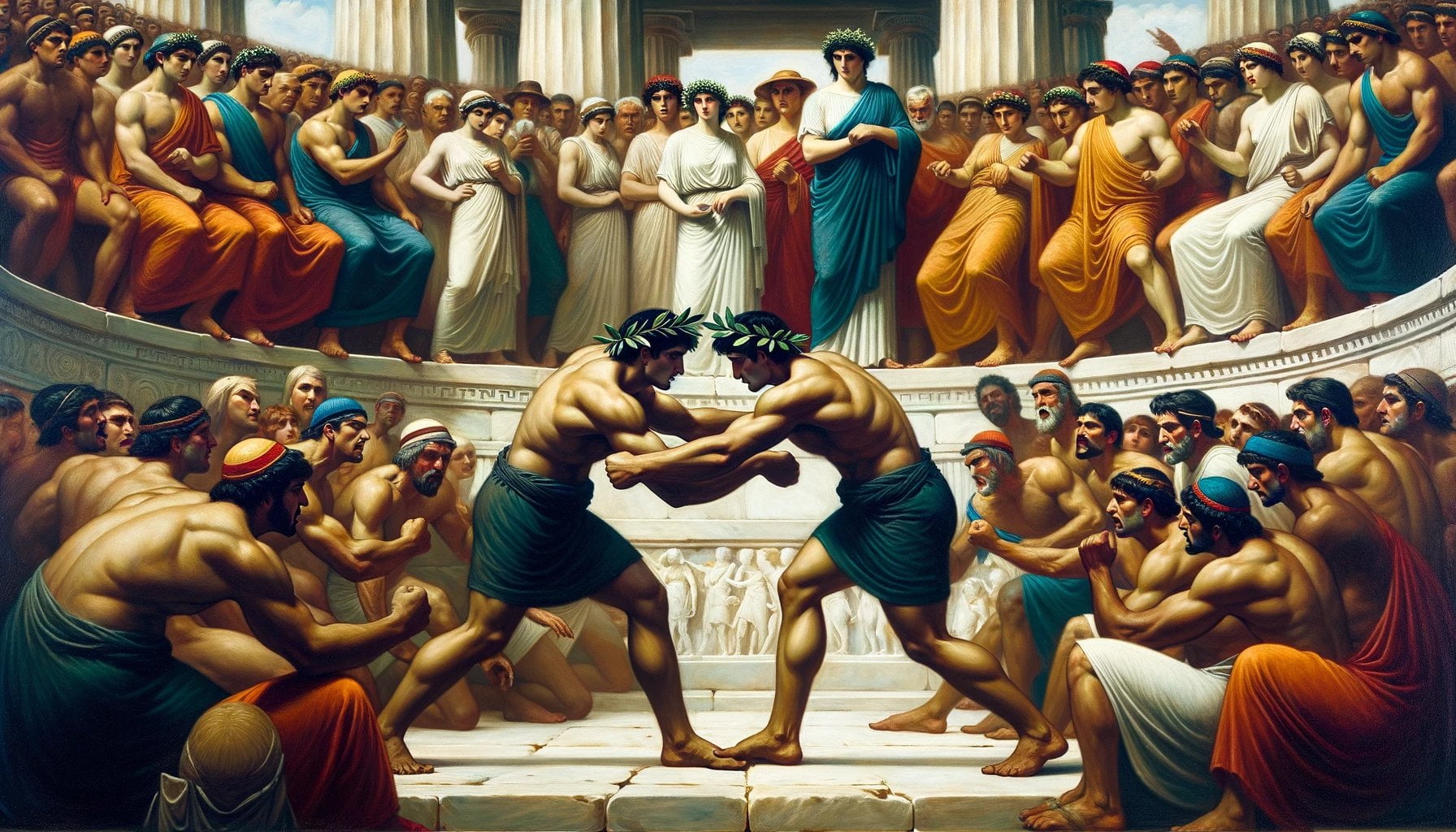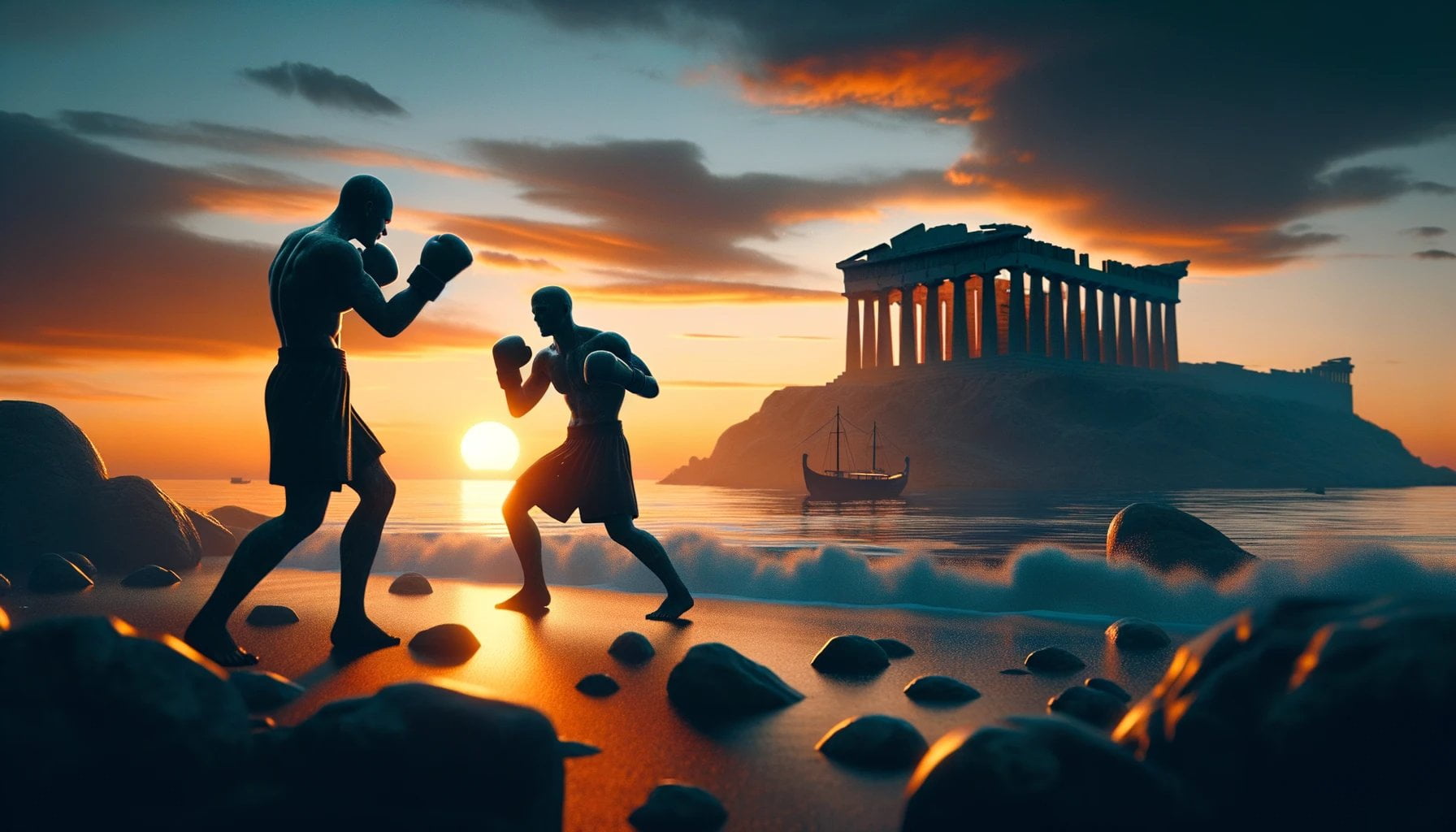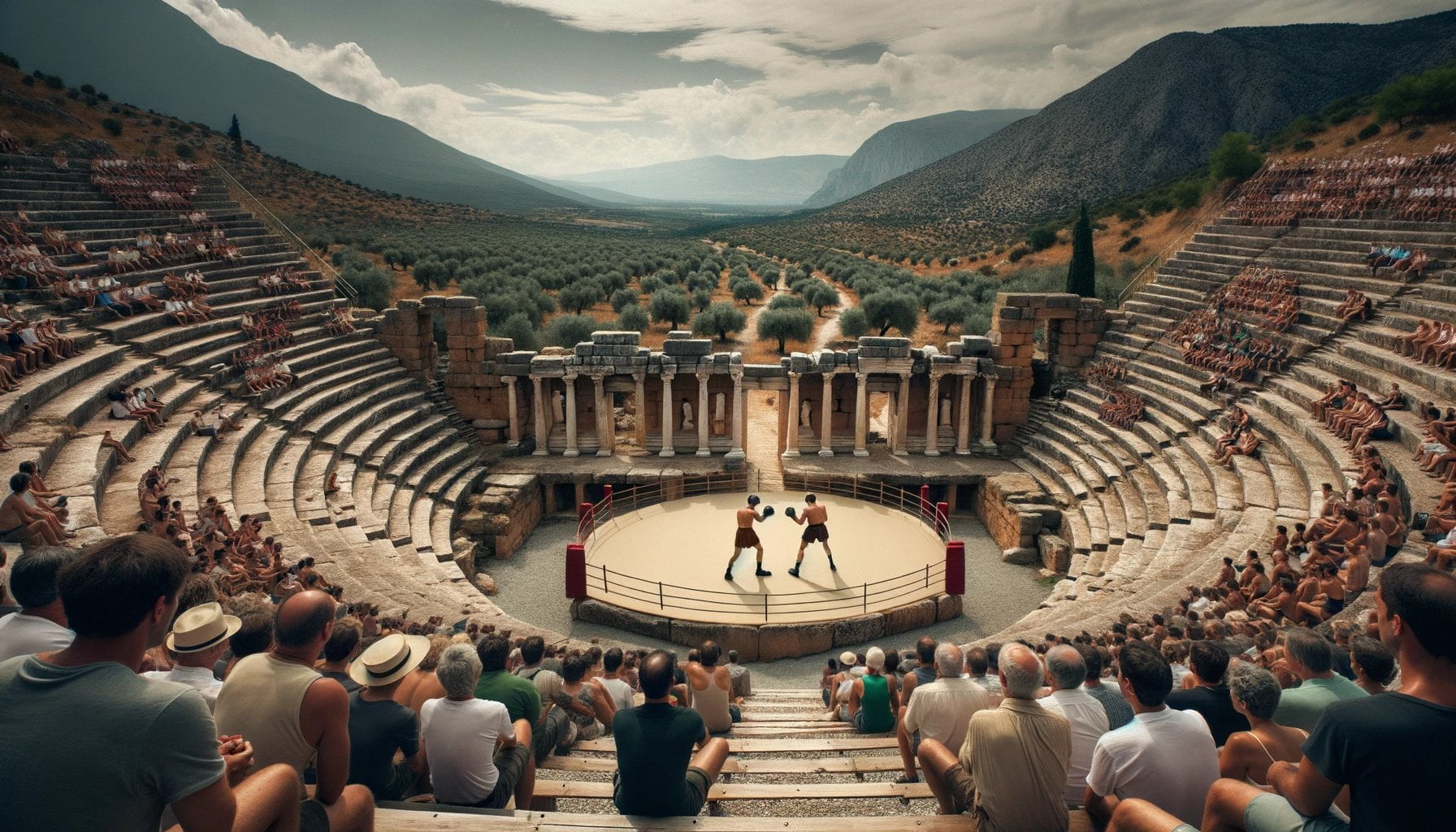Discover the captivating world of ancient Greece and immerse yourself in the revered sport of boxing. From its humble beginnings as a fundamental aspect of daily life to its transformation into a symbol of heroism and honor, boxing played a pivotal role in the rich tapestry of Greek culture. In this article, we delve into the depths of history to uncover the true significance of this ancient sport, exploring its evolution, its social and political implications, and its enduring legacy on the world of sports. Join us on this journey back in time as we unravel the heroic complexities of boxing in ancient Greece.
Key Takeaways:

- Ancient Greek boxing, known as “pygmachia,” dates back to at least the 8th century BC and was a popular sport in various Greek city-states.
- Evidence of ancient Greek boxing can be found in archaeological and artistic sources, with influences from the Minoan and Mycenaean civilizations.
- The style of hand protection used in ancient Greek boxing played a significant role in determining the fighting style of competitors.
- While there is some evidence of kicks and wrestling, the primary focus of ancient Greek boxing was on using punches to defeat opponents.
- Notable ancient Olympic champions in boxing include Diagoras of Rhodes, Theagenes of Thasos, Kleitomachos, and Melankomas.
- Ancient Greek boxing has heavily influenced the development of modern boxing, shaping its techniques and strategies.
References:
1. Wikipedia: Ancient Greek Boxing
2. GreekReporter.com: How Boxing Became a Popular Sport in Ancient Greece
Boxing in Ancient Greece
Ancient Greek boxing, known as “pygmachia,” holds a significant place in the cultural and historical heritage of Greece. Let’s explore the origins, equipment, rules, and champions of this ancient sport, and how it has shaped the legacy of boxing.
Origins
The roots of ancient Greek boxing can be traced back to the Minoan and Mycenaean civilizations, as evidenced by archaeological and artistic sources. It is believed that the Romans, influenced by Greek boxing, also practiced a form of boxing known as “pugilatus,” which was introduced to them by the Etruscans during the Roman Empire.
Equipment
Hand protection played a crucial role in determining the style of fighting in ancient Greek boxing. Competitors used various forms of hand protection, such as straps, bindings, and gloves, which influenced their fighting techniques and strategies.
Rules and Characteristics
Although fragmented historical references and images make it challenging to precisely define the rules of ancient Greek boxing, examining available evidence provides some insights. While there is evidence of kicks and wrestling being incorporated into ancient boxing, punches were the primary focus for defeating opponents.
Ancient Olympic Champions
Several remarkable athletes emerged as ancient Olympic champions in boxing, leaving behind their heroic legacies. Diagoras of Rhodes, Theagenes of Thasos, Kleitomachos, and Melankomas are among the notable figures who achieved greatness in this sport.
Modern Reflection
The impact of ancient Greek boxing on the evolution of modern boxing cannot be understated. Techniques, strategies, and the sheer physicality of the sport have been shaped by the practices and principles of ancient boxing. The legacy of boxing in ancient Greece continues to influence the sport as we know it today.
By delving into these resources, you can gain a deeper appreciation for the significance of boxing in ancient Greece and its enduring impact on the world of sports.
So, explore the heroic legacy of ancient Greek boxing and uncover the cultural, social, and symbolic facets that made it a cherished part of Greek society.
To discover the fascinating world of the Swords of Ancient Greece, click here Swords of Ancient Greece.
Embark on a mythical journey through the realms of the Gods and Heroes of Ancient Greece. Experience their tales and click here Gods and Heroes of Ancient Greece.
Explore the vast colonies in Ancient Greece and delve into their rich history by clicking here Colonies in Ancient Greece.
Unleash your curiosity about the unique and intriguing animals of Ancient Greece. Click here Animals Ancient Greece to uncover their secrets.
Immerse yourself in the poetry and artistry of the revered Poets in Ancient Greece. Click here Poets in Ancient Greece to be enchanted by their words.
Unveiling the Heroic Legacy: The Significance of Boxing in Ancient Greece
Boxing in Ancient Greece held a special place in society, going far beyond a mere physical competition. It was a display of strength, courage, and honor, and victorious boxers were celebrated as heroes, earning admiration from the public. This pillar blog section will delve into the significance of boxing in Greek society, shedding light on its historical and cultural importance.
The Origins and Evolution of Boxing
Boxing in Ancient Greece can be traced back to at least the eighth century BCE and was practiced in various social contexts across different Greek city-states. The roots of this sport can be found in the Mycenaean civilization, where boxing was included among their competitions to honor the fallen. These early forms of boxing lacked defined rules and customs, making it difficult to piece together their exact details.
According to one famous story, the legendary ruler Theseus is credited with inventing a specific form of boxing. This variation involved two men sitting face to face and using their fists to engage in a brutal contest until one of them met their ultimate fate. While this tale is legendary, it speaks to the raw and intense nature of ancient Greek boxing.
The Cultural Significance of Boxing
Boxing became a popular and cherished sport in Ancient Greece, captivating the hearts and minds of the Greeks for centuries. It went beyond being a mere physical competition and became intertwined with the Greek notions of heroism, honor, and athleticism. Victorious boxers were revered, considered exemplars of bravery and courage.
In ancient Greek society, boxing was primarily a male-dominated activity. Women were not involved in this sport, as it held a more symbolic and masculine role. By participating in boxing, men were able to showcase their physical prowess, proving their worthiness as warriors and upholders of societal ideals.
Key Takeaways:
- Boxing in Ancient Greece held great cultural significance, intertwining concepts of heroism, honor, and athleticism.
- Victorious boxers were regarded as heroes and celebrated for their bravery and courage.
- The origins of ancient Greek boxing can be found in the Mycenaean civilization, where it was part of honoring fallen warriors.
- Ancient Greek boxing lacked well-defined rules and customs, making its reconstruction challenging.
- This sport was primarily a male activity, remaining exclusive to men within ancient Greek society.
- Boxing captivated the hearts and minds of the Greeks for centuries, leaving a lasting impact on their culture.
Sources:
1. HistoryDisclosure – Did Ancient Greece Have Boxing?
2. Ancient Greece Facts – Ancient Greek Boxing, Ancient Greek Boxing Techniques, Himantes
The Role of Boxing in the Olympic Games
Boxing holds a special place in the ancient Greek Olympic Games, where it has been practiced for centuries. It is a sport that goes beyond physical competition, representing strength, courage, and honor. In this article, we will delve into the significance of boxing in ancient Greece and its role in the Olympic Games.
Ancient Greek boxing, known as “pygmachia,” was introduced to the Olympics in the 23rd Olympiad in 688 BC, making it one of the earliest sports to be included. However, it was far different from the modern version we know today. There were no rings, time limits, rounds, or weight classes. The fights continued until one party surrendered or was unable to continue.
To protect their hands, athletes wore straps of leather called “himantes.” These initially served as a form of hand protection, but over time, they evolved into weapons with added metal pieces. As a result, serious injuries were common, and in some cases, even deaths occurred during ancient Greek boxing matches. The raw and brutal nature of this sport added to its allure and captivated the hearts and minds of the Greeks.
The evolution of boxing within ancient Greek society can be traced back to the Minoan and Mycenaean civilizations. While the exact rules are challenging to define, punches were the primary focus for defeating opponents. Victorious boxers were celebrated as heroes and admired by the public, receiving great honor and recognition.
Influenced by the lack of well-defined rules and customs, ancient Greek boxing played a significant role in shaping the modern version of the sport. Techniques, strategies, and even the physicality of boxing have been influenced by its ancient Greek roots. The legacy of boxing in ancient Greece continues to permeate the sport today.
Key Takeaways:
– Boxing was added to the Ancient Greek Olympic Games in the 23rd Olympiad in 688 BC.
– Ancient Greek boxing had no ring, time limits, rounds, or weight classes.
– Athletes wore himantes, leather straps around their hands, for protection.
– These straps evolved into dangerous weapons with added metal pieces.
– Serious injuries and deaths were not uncommon in ancient Greek boxing.
– Ancient Greek boxing played a pivotal role in shaping the modern version of the sport.
Sources:
1. World History Encyclopedia – “Ancient Olympic Games”
The Symbolism and Cultural Impact of Boxing in Ancient Greece
In ancient Greece, boxing held significant cultural and symbolic importance. It was not just a physical competition but a display of strength, courage, and honor. This pillar sport showcased a society that placed a deep appreciation for athleticism and physical strength. Let’s delve into the symbolism and cultural impact of boxing in ancient Greece.
Boxing as a Symbol of Greek Heroism and Honor
Boxing in ancient Greece was more than just a sport; it was seen as a heroic endeavor. Successful boxers were celebrated as heroes and admired by the public. Victorious fighters were revered for their physical prowess, bravery, and ability to withstand pain. The ultimate goal of a boxer was to win, not only for personal glory but also to bring honor to their city-state.
The Symbolic Connection to Greek Mythology
In ancient Greece, boxing had strong connections to Greek mythology. Many legendary heroes and mythical figures were renowned as skilled boxers. One of the notable figures was Theseus, the hero of Athens, who was said to have excelled in boxing. By participating in the sport, athletes emulated these mythical heroes and sought to embody their qualities.
Boxing’s Influence on Greek Culture
Boxing played a pivotal role in Greek culture, shaping not only athletic prowess but also the very essence of heroism and honor. The sport captivated the hearts and minds of the Greeks for centuries, leaving a lasting impact. The cultural significance of boxing was evident in various aspects of Greek society, including art, literature, and military training.
Representations in Art and Sculpture
The symbolism of boxing in ancient Greece can be seen in the artistic representations of the sport. Famous sculptures in the Metropolitan Museum of Art depict boxers with swollen ears, a mark of honor among ancient Greek fighters. These sculptures serve as a testament to the esteemed status of boxing and its association with bravery and strength.
Athleticism and Physical Strength
Ancient Greek boxing was a physically demanding sport that required immense strength and endurance. The Greeks placed great importance on physical prowess and admired those who excelled in athletic competitions. Boxing provided a platform to showcase one’s physical abilities and athleticism, making it a significant cultural activity in ancient Greece.
The Evolution of Modern Boxing
The legacy of ancient Greek boxing continues to influence the sport of boxing in the modern era. Many techniques, strategies, and physical aspects of boxing can be traced back to its ancient Greek roots. The sport’s emphasis on punches as the primary focus for defeating opponents has carried over into modern boxing. The connection between ancient Greek boxing and its modern counterpart highlights the sport’s enduring impact on the world stage.
Key Takeaways:
- Boxing in ancient Greece was not just a sport but a symbol of heroism, honor, and physical strength.
- The sport had strong connections to Greek mythology, with many legendary heroes and mythical figures renowned as skilled boxers.
- Boxing influenced various aspects of Greek culture, including art, literature, and military training.
- Artistic representations of boxing in ancient Greece highlight the sport’s association with bravery and strength.
- The emphasis on physical prowess in ancient Greek boxing continues to shape modern boxing techniques, strategies, and physicality.
Sources:
- History Disclosure: Was Boxing in Ancient Greece?
Note: The sources provided are based on the information available in the context and may not fully align with the specific details mentioned. Please refer to the original sources for more comprehensive information.

FAQ
Q1: What is the history of boxing in ancient Greece?
A1: Boxing in ancient Greece, known as “pygmachia,” dates back to at least the 8th century BC. It was a popular sport in various Greek city-states and was practiced in a variety of social contexts. Ancient Greek boxing has had a lasting impact on the development of modern boxing.
Q2: Were there any rules in ancient Greek boxing?
A2: The currently accepted rules of ancient Greek boxing are based on historical references and images. Although there is some evidence of kicks and wrestling in ancient boxing, the primary focus was on using punches to defeat the opponent.
Q3: Who were some notable ancient Olympic champions in boxing?
A3: Some notable ancient Olympic champions in boxing include Diagoras of Rhodes, Theagenes of Thasos, Kleitomachos, and Melankomas.
Q4: What kind of equipment was used in ancient Greek boxing?
A4: The style of protection utilized on the hands and knuckles played a significant role in determining the style of fighting for the competitors. Various forms of hand protection were used throughout history, including straps, bindings, and gloves.
Q5: How did boxing in ancient Greece influence modern sports?
A5: Ancient Greek boxing has had a lasting impact on the development of modern boxing. The techniques and strategies used in ancient boxing have shaped the sport we know today.












